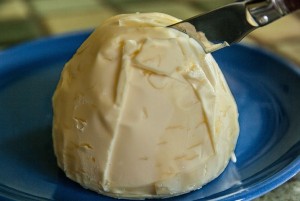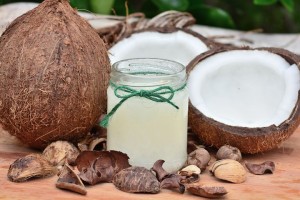If this post leads you to believe that we’re jumping on the coconut oil bandwagon, that’s only partially true. Sure, you’ve probably seen countless articles, blog posts and emails that all herald coconut oil as a “miracle” or “super” food. We were actually going to write a post on the subject long ago. However, when doing the research, the information at the time seemed to be conflicting. None of the authoritative references we like to cite came down conclusively on coconut oil’s side. At best, most of them cautiously conceded to a few benefits, but overall still recommended avoiding coconut oil or at least including it sparingly in your diet.
Likely at the heart of the hesitation to promote coconut oil is people’s tendency to go overboard with health recommendations. If a study comes out that seems to show that high protein diets are good for you, everyone starts shunning the other food groups and fills their plates with all the meat they can eat. (Keto, anyone?) Then, when a study is published a few months later negates the findings of the first study, all of a sudden everyone is off meat and back on the vegetable and grains train.
Lately, though, we’ve come across credible references that indicate that coconut oil lovers are right. Including coconut oil in your diet can benefit you on many levels.
Naturally Saturated is OK

Virgin organic coconut oil is good for you and can strengthen immunity, brain, liver and lung function and can enhance your metabolism.
Coconut oil gets shoved into a gray area mostly because it’s a saturated fat. When trying to keep the task of sorting through fats simple, we’ve been taught that saturated fats are evil and monounsaturated and polyunsaturated fats are good. Sorry, though, it isn’t that simple. It’s when fat is manipulated in the lab to give it a longer shelf life that it becomes unhealthy. The process is called hydrogenation, and it can turn even an innocent unsaturated vegetable oil into an unwholesome, saturated trans fat. It’s the trans fats that you should really watch out for.
In fact, natural saturated fat is not only OK but a necessity for health. Two respected doctors who specialize in the field of obesity outlined for the readers of Four Hour Work Week seven reasons to eat more saturated fat, including stronger bones, improved brain, liver and lung health, stronger immunity, enhanced metabolism and, most surprising, lowered cardiovascular risks. According to Doctors Michael and Mary Dan Eades, saturated fat lowers lipoprotein (a) levels that are associated with heart disease risk.
It’s the Lauric Acid

Yes, coconut oil has more saturate fat than butter, but it’s a natural unhydrogenated fat that your body needs.
An element that plays a big part in letting coconut oil off the hook is lauric acid. Around half of coconut oil’s saturated fat content — which is almost 50 percent more than the saturated fat content of butter — is from the rare natural fat that gives coconut oil its legendary status. According to Dr.Mercola, when your body uses lauric acid, it becomes monolaurin, a powerful bacteria, virus and even parasite slayer. Monolaurin has been shown to demolish pathogenic bacteria, herpes, HIV, measles and flu viruses and can also rid the body of giardia parasites.
That’s No Typo — We Said “Weight Loss”

Studies have shown that supplementing coconut oil helps take fat off your middle, and does it without increasing cholesterol.
This is one of those cases where “too good to be true” isn’t. If you’ve read that coconut oil can help you lose weight, you read right. A study published on the National Center for Biotechnology Information concluded that supplementing coconut oil in the diet promotes abdominal weight reduction. That could be because coconut oil is a medium-chain fatty acid by over half. The Pennington Biomedical Research Center says that “MCFAs” stimulate metabolism to increase fat burning and reduce abdominal fat. They’re easy to digest and take the fast-track to your liver which converts MCFAs to energy for immediate use instead of converting them to fat for storage. That means that coconut oil not only encourages fat burning, but also won’t contribute to fat gain. Another interesting note in the study is that supplementing coconut oil did not cause an increase in lipids, as you might suspect it would. That’s good news on the cholesterol front.
Overall Beauty Treatment
Including coconut oil in your diet can improve your body from the inside out because it boosts your immune system, encourages cell regeneration, and facilitates fat burning. However, you can also benefit from using it topically. Health Ambition lists a whole slew of beauty uses for coconut oil including using it as a
- hair conditioner
- skin moisturizer
- lip balm
- cuticle softener
- eye cream
- shaving cream
- makeup remover
You can even make a moisturizing exfoliating scrub by mixing equal parts of coconut oil with sea salt or sugar.
Make Moderation Your Mantra
Just as with anything in life, using coconut oil in moderation is the key. Don’t clear your pantry of other healthy oils such as olive or safflower oil and begin using coconut oil exclusively. Don’t slather it on everything you eat from here on out. As Registered Dietician Kristin Kirkpatrick tells the Huffington Post, focus on portion control just as much as what is in those portions. If you keep “moderation” as your mantra, coconut oil can be a health-improving addition to your diet.
The Most Beneficial Part of Coconut Oil
If you’re thinking of taking coconut oil as a supplement, you might consider using MCT oil instead. As Cognitune explains, MCT oils are the specific parts of coconut oil that are the most beneficial. You can find out more about this amazing elixir and how it’s level of purity takes coconut oil supplementation up a notch in their video:


